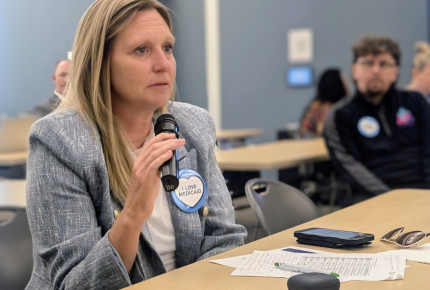 Volunteer advocates with the American Cancer Society Cancer Action Network (ACS CAN) and the newly-formed Protect Medicaid Utah coalition gathered Wednesday afternoon to oppose work requirements for Medicaid which is currently being considered by the Utah Department of Health and Human Services.
Volunteer advocates with the American Cancer Society Cancer Action Network (ACS CAN) and the newly-formed Protect Medicaid Utah coalition gathered Wednesday afternoon to oppose work requirements for Medicaid which is currently being considered by the Utah Department of Health and Human Services.
During a public hearing, Brook Carlisle, ACS CAN Utah Government Relations Director explained to DHHS officials how work requirements would negatively impact Utahns with cancer and potentially undermine progress made in the fight against the disease.
“If work or community engagement is required as a condition of eligibility for the Medicaid expansion population, a significant number of enrollees, including cancer patients, recent survivors, and those with other chronic illnesses could find that they are ineligible for the lifesaving care and treatment services provided through the Medicaid program,” said Carlisle.
More than 352,000 Utahns currently rely on Medicaid for health insurance and children account for nearly half of that figure.
Work requirements currently being considered by DHHS could lead to tens of thousands of Utahns, including those with a history of cancer, from being cut off from critical health care. Recipients would be required to complete 48 job applications within the first three months of applying for Medicaid expansion. ACS CAN knows that asking enrollees to prove work activities or “exemptions” to the government burdens event those who do not meet the requirement and leads to coverage losses.
“Implementation of this waiver could jeopardize the health of countless Utahns being treated for cancer and people with a history of cancer, or other serious disease, as well as thousands of state residents who rely on Medicaid to access cancer prevention and early detection services, such as colonoscopies, mammograms, and tobacco cessation services,” explained Carlisle during public comment.
Many cancer patients in active treatment are often unable to work or require significant work modifications due to their treatment. Research suggests that between 40 and 85 percent of cancer patients stop working while receiving cancer treatment, with absences from work ranging from 45 days to six months depending on the treatment. Work requirements place an unnecessary barrier to essential health care on cancer patients, survivors, and people with other chronic illnesses.
 Volunteer advocates with the American Cancer Society Cancer Action Network (ACS CAN) and the newly-formed Protect Medicaid Utah coalition gathered Wednesday afternoon to oppose work requirements for Medicaid which is currently being considered by the Utah Department of Health and Human Services.
Volunteer advocates with the American Cancer Society Cancer Action Network (ACS CAN) and the newly-formed Protect Medicaid Utah coalition gathered Wednesday afternoon to oppose work requirements for Medicaid which is currently being considered by the Utah Department of Health and Human Services.